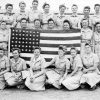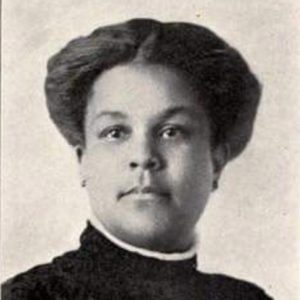calsfoundation@cals.org
Mame Stewart Josenberger (1872–1964)
Businesswoman and activist Mame Stewart Josenberger started her career as an educator but, after her husband’s death, assumed control of a variety of businesses. She also served as president of the Arkansas Association of Colored Women and was on the advisory board of The Crisis, the renowned publication of the National Association for the Advancement of Colored People (NAACP), in addition to involvement with a variety of local, state, and national organizations.
Mame Stewart was born on August 3, 1872 (although some sources say 1868), in Owego, New York, to Virginia natives Frank Stewart and Mary Elizabeth Turner Stewart. After attending the Owego Free Academy in New York, Stewart earned a BA in education at Fisk University in Nashville, Tennessee, from which she graduated in 1888 along with scholar and political activist W. E. B. DuBois. After graduation, Stewart taught mathematics at Tuskegee Institute in Alabama. She then moved to Holly Springs, Mississippi, and taught at the State Normal School for Negroes, known today as Rust College. In 1890, she relocated to Fort Smith (Sebastian County) and began teaching at Howard School, the only African-American high school in western Arkansas.
In January 1892, Stewart married African-American furniture store owner and undertaker William Ernest Josenberger. He was also a postman and the secretary of the Fort Smith branch of the Mutual Benefit Association of the National Association of Letter Carriers, and a member of the Arkansas Republican Party. In 1893, the Josenbergers welcomed their only child, a daughter named William Ernest (Ernestine) Josenberger, later Stevens. Mame Josenberger’s husband died of laryngitis in September 1909. Her daughter died from peritonitis in 1919.
After her husband’s death, Josenberger took over the family’s business, which included a funeral home; Josenberger Hall, an entertainment venue on 619 1/2 Ninth Street in Fort Smith; a burial insurance company; and property in the Taborian Heights area of Little Rock (Pulaski County). In 1920, Josenberger’s estimated worth was $30,000 (approximately $398,782.54in 2019). A shrewd businesswoman, Josenberger was a member of the National Negro Business League (NNBL), an organization founded in Boston, Massachusetts, in 1900 by Booker T. Washington.
Josenberger’s community and organizational affiliations were considerable. In 1903, she was the Grand Register of Deeds of Arkansas of the Grand Order of Calanthe, a fraternal benefit organization founded in Texas in 1897 to provide burial insurance for African Americans. In 1907, she was elected the organization’s Supreme Assistant Conductress and was the Supreme Orator of the “colored” Knights of Pythias in the 1920s. She was also a member of Fort Smith’s St. Augustine’s Protestant Episcopal Church, the National Association of Colored Women (NACW), and the Arkansas Association of Colored Women founded in 1905 (she was president from 1929 to 1931). Josenberger cofounded Fort Smith’s Phillis Wheatley Federated Club in 1898, just two years after the NACW’s establishment in 1896, and was its president for fifty-six years.
Josenberger was a lifetime member of the NAACP and served on the advisory board of the organization’s journal, The Crisis, in 1916; the following year, she donated twenty-five dollars to support its anti-lynching campaign. Following World War I, she was increasingly involved in anti-lynching and social reform and global peace activism through the International Council of Women of the Darker Races (ICWDR), established in 1922. Josenberger was an ICWDR executive committee member, the finance committee chair, and treasurer.
Josenberger’s involvement in the NACW, the AACW, the ICWDR, the NNBL, and the NAACP remained consistent throughout the years even while she managed her businesses in Fort Smith. She was honored in 1951 at the AACW’s forty-sixth annual meeting in Pine Bluff (Jefferson County) for her service to the organization.
Josenberger died on September 29, 1964, and is buried in Fort Smith’s Oak Cemetery. By 1967, her buildings on Ninth Street in Fort Smith, including Josenberger Hall, had been torn down. The mortuary business was sold to the Roswell family, who took over its operations.
No physical monuments commemorate Josenberger’s influence in Fort Smith. However, her organizational affiliations and connections to local, national, and international black women leaders helped improve African Americans’ access to economic, social, and political opportunities at a time when their grasp on each of these was, at best, tenuous.
For additional information:
“Changes in Court of Calanthe.” Western Outlook (Oakland, California), January 29, 1916.
“Colored Women Hold Three Day Session in Washington of World International Council.” New York Age, August 18, 1923, p. 5.
“Edna Douglas Is Guest at AACW’s 46th Session.” Chicago Defender, June 23, 1951, p. 9.
“Fisk University, The Twenty-First Annual Commencement Exercises of the Institution.” The Tennessean (Nashville, Tennessee), June 14, 1888, p. 5.
Gordon, Fon Louise. “Black Women in Arkansas.” Pulaski County Historical Review 35 (Summer 1987): 26–37.
Jones-Branch, Cherisse. “Mame Stewart Josenberger.” Journal of the Fort Smith Historical Society 43 (April 2019): 23–28.
Mather, Frank Lincoln. Who’s Who of the Colored Race: A General Biographical Dictionary of Men and Women of African Descent. Chicago: n.p.: 1915.
Terborg-Penn, Rosalyn. African American Women in the Struggle for the Vote, 1850–1920. Bloomington: Indiana University Press, 1998.
Cherisse Jones-Branch
Arkansas State University
 Business, Commerce, and Industry
Business, Commerce, and Industry Civil Rights and Social Change
Civil Rights and Social Change Early Twentieth Century, 1901 through 1940
Early Twentieth Century, 1901 through 1940 Women
Women Mame Stewart Josenberger
Mame Stewart Josenberger 



Comments
No comments on this entry yet.